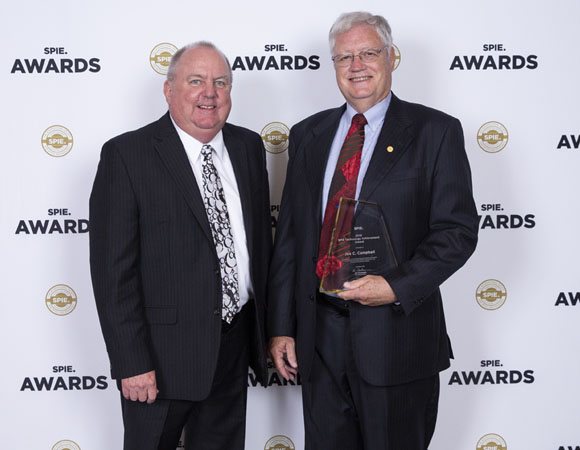The award recognizes outstanding technical accomplishment in optics, electro-optics, photonic engineering, or imaging

Joe. C. Campbell (right) receiving his award from SPIE President-Elect John Greivenkamp.
BELLINGHAM, Washington, USA and CARDIFF, UK - Yesterday evening, at the Awards Banquet at SPIE Optics + Photonics in San Diego, SPIE, the international society for optics and photonics, honored Joe. C. Campbell with the Society's Aden and Marjorie Meinel Technology Achievement Award. Campbell is recognized for his pioneering contributions to high-speed, low-noise avalanche photodiodes (APDs) used in optical communication systems.
APDs are the basis of high-sensitivity receivers and are used throughout the world by a wide variety of companies. Campbell, the Lucien Carr III Professor of Electrical and Computer Engineering at University of Virginia, has been a leader in APD research for the past 30 years.
In recent years, Campbell's group has continued to refine and improve the performance of APDs, advancing the fundamental knowledge of the physical principles that contribute to low-noise and high-gain bandwidth products in APDs. Modeling by Campbell's students has shown that the very low multiplication noise that has been achieved is a result of the nonlocal nature of impact ionization and its importance in APDs with thin multiplication regions. Using new materials and structures, Campbell's group has demonstrated record low noise and gain-bandwidth products for communications APDs.
"There can be no question that Joe was the major contributor worldwide in developing useful long wavelength (1300-1600 nm) APDs," said Larry Coldren, Fred Kavli Professor of Optoelectronics and Sensors at University of California, Santa Barbara. "His original invention of the separate absorption and multiplication structure, as well as his many contributions to novel structures since, has had a major impact in the optical communications arena. He continues to make significant contributions to detectors and receivers in the UV and visible as well as in the IR spectral regions."
About SPIE
SPIE is the international society for optics and photonics, an educational not-for-profit organization founded in 1955 to advance light-based science, engineering, and technology. The Society serves 257,000 constituents from 173 countries, offering conferences and their published proceedings, continuing education, books, journals, and the SPIE Digital Library. In 2018, SPIE provided more than $4 million in community support including scholarships and awards, outreach and advocacy programs, travel grants, public policy, and educational resources. www.spie.org.
________________________________________
Contact:
Daneet Steffens
Public Relations Manager
daneets@spie.org
+1 360 685 5478
@SPIEtweets